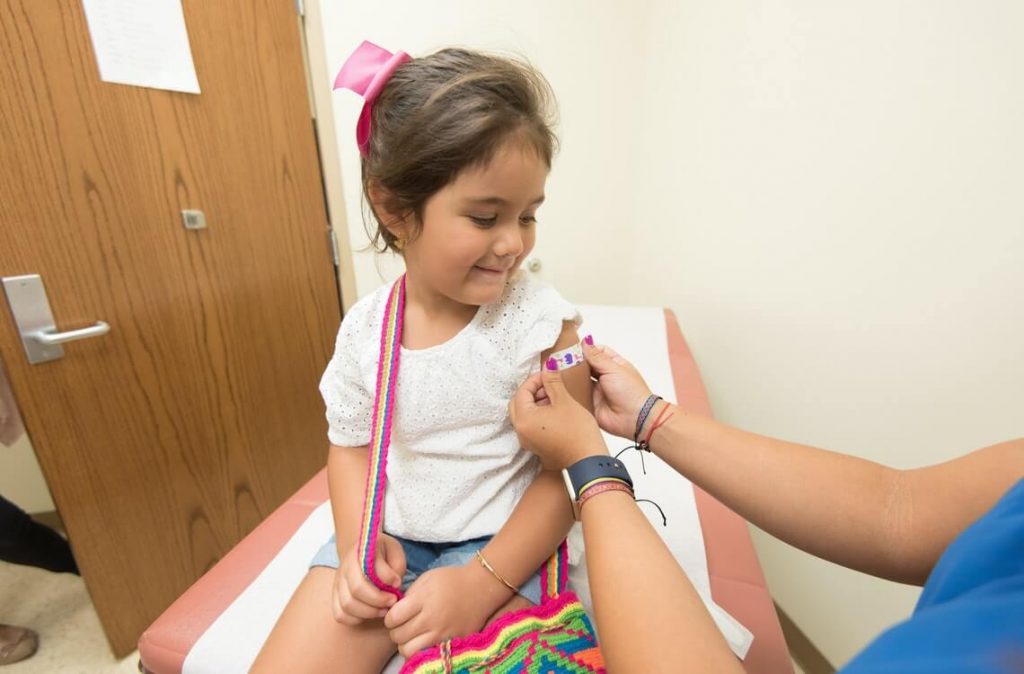During this COVID-19 pandemic, everyone is looking for ways to keep themselves and their loved ones healthy. For us mummies, we certainly want to avoid unnecessary clinic visits, hospital admissions, school absenteeism and COVID-19 screenings for our little ones.
Immunisation is one of the best ways to protect our children from serious childhood diseases.
While we eagerly wait for the COVID-19 vaccine to be ready, let’s focus on ensuring that our children are protected against serious preventable childhood diseases by keeping up to date with their childhood vaccinations.
I had the opportunity to seek the views of a doctor regarding this matter. Here’s an expert voice on this topic from Dr Tengku Putri Zainab. She’s a paediatrician at Sunway Specialist Centre Damansara.
What Are The Available Childhood Vaccinations in Malaysia?
The Malaysian National Immunization Program (NIP) includes vaccines that offer protection against 12 major childhood diseases which includes Diphtheria, Pertussis (Whooping Cough), Tetanus, Haemophilus Influenza Type B, Poliomyelitis, Hepatitis B, Tuberculosis, Measles, Mumps, Rubella, Japanese Encephalitis and Human Papilloma Virus (HPV).
There are also optional vaccines which are recommended and have yet to be included in the NIP. These include Pneumococcal, Rotavirus, Influenza, Chicken Pox (Varicella Zoster), Hepatitis A, and Meningococcal Vaccine.
The compulsory vaccines under the NIP are provided absolutely free of charge and halal at all government clinics nationwide. The compulsory and optional vaccines, however, are available at private hospitals and clinics for a fee.
These vaccines are safe as they have gone through years of safety testing. It is not advisable to skip or delay vaccines, as this will leave the child vulnerable to diseases.
My Child Missed Some Vaccinations During MCO. Can We Still Get Them?
Please do! Skipping appointments is risky and can leave your child vulnerable to serious diseases.
As such, we highly encourage parents to come forward as soon as possible to have your children’s vaccination card reviewed by your selected health care provider.
Most vaccines can still be taken even though the scheduled subsequent dose has been delayed for a few months. The vaccine series usually do not need to be restarted, or doses added even though there is an extended interval between them.
However, with the exception of Rotavirus vaccine, if the delay has reached beyond six or eight months (depending on the brand), and the full course of the vaccine has not been completed, then catch-up vaccination can’t be given.
Rest assured that healthcare centres are practising safety measures as per MOH guidelines to ensure the safety of patients. There will be screenings at every hospital and clinic entrance, as well as extra cleaning and disinfection protocols.
Hence, even during this current situation, you should feel safe to bring your child to the clinic, while taking the necessary precautions yourself. Wear a face mask and practise physical distancing.
Since Covid-19 Vaccine is Still Unavailable, Are There Any Particular Vaccine That’s Recommended At This Time?
All compulsory childhood vaccinations should be up to date and not delayed, especially during a pandemic. Apart from that, reducing the spread of respiratory illnesses like Influenza (Flu) is more important than ever.
Being a tropical country that Malaysia is, Flu occurs all year round. Hence, it is important to be protected against Flu by taking the Influenza vaccine.
Why is Influenza Vaccine Important?
Influenza (Flu) and COVID-19 are both contagious respiratory illnesses, but they are caused by different viruses.
Because some of the symptoms of Flu and COVID-19 are similar, it may be hard to tell the difference between them based on symptoms alone. Tests are needed to help confirm a diagnosis.
Common symptoms that COVID-19 and Flu share include fever, cough, shortness of breath, fatigue, sore throat, muscle pain and headaches.
By taking the Influenza vaccine, it reduces the risk of developing flu and its complications, hence reducing the chance of unnecessary COVID-19 testing.
Influenza vaccine reduces the risk of developing serious flu complications such as pneumonia (lung infection), dehydration, worsening asthma, sinus and ear infection. This reduces the risk of hospitalisation.
One recent study showed that Influenza vaccine can reduce a child’s risk of flu-related Paediatric ICU admission by 74%. This is especially important during this pandemic to reduce the stress in our health care system by reducing the risk of hospital admissions.
Influenza vaccine is safe and is the best protection against Flu. Centers of Disease Control and Prevention (CDC) recommends everyone who is six months of age and older to get seasonal flu vaccine each year.
Apart From Childhood Vaccinations, How Else Can I Boost My Child’s Immunity?
Some of the steps to you can take to protect your child is to follow the everyday preventative actions. Some of these simple measures include:
- Cleaning your hands often with soap and water or alcohol-based hand sanitiser.
- Avoid people who are sick, and ensure physical distancing between your child and other people outside of your home.
- Wear a mask over the nose and mouth if your child is more than two years old.
- Clean and disinfect high touch surfaces daily in household common areas such as tables, doorknobs and light switches.
- Teach and reinforce these actions and be a good role model to your child. If you wash your hands often, they are more likely to do the same.
You should also help your child to stay active by encouraging them to play outdoors which is great for their physical and mental health. Go for a walk or take a bike ride with them.
You can also practice indoor exercises with them such as doing jumping jacks and jumping ropes.
Adopt a well-balanced diet containing citrus fruits, leafy vegetables, nuts, seeds, and legumes to boost their immune system. This needs to be complemented by adequate amounts of carbohydrates, proteins, and fats.
They should also have a good amount of sleep every day.
